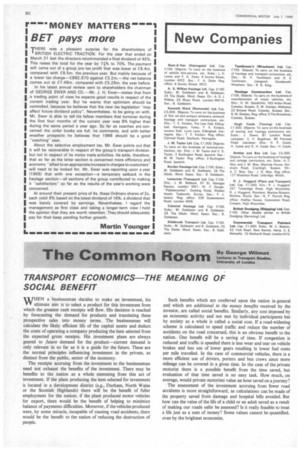The Common Room By George Wilmot
Page 82

If you've noticed an error in this article please click here to report it so we can fix it.
Lecturer in Transport Studies, University of London
TRANSPORT ECONOMICS THE MEANING OF SOCIAL BENEFIT
WHEN a businessman decides to make an investment, his ultimate aim is to select a product for this investment from which the greatest cash receipts will flow. His decision is reached by forecasting the demand for products and translating these prospective sales into money terms. The businessman will calculate the likely efficient life of the capital assets and deduct the costs of operating a company producing the item selected from the expected gross receipts. His investment plans are always geared to future demand for the product—current demand is only relevant in so far as it is a guide for the future. These are the normal principles influencing investment in the private, as distinct from the public, sector of the economy.
The receipts accruing from the investment to the businessman need not exhaust the benefits of the investment. There may be benefits to the nation as a whole stemming from this act of investment. If the plant producing the item selected for investment is located in a development district (e.g., Durham, North Wales or the Scottish Highlands) there will be the benefit of fuller employment for the nation: if the plant produced motor vehicles for export, there would be the benefit of helping to minimize balance of payments difficulties. Moreover, if the vehicles produced were, by some miracle, incapable of causing road accidents, there would be the benefit to the nation of reducing the destruction of people.
Such benefits which are conferred upon the nation in general and which are additional to the money benefits received by the investor, are called social benefits. Similarly, any cost imposed by an economic activity and not met by individual participants but by society as a whole is called a social cost. If a road-widening scheme is calculated to speed traffic and reduce the number of accidents on the road concerned, this is an obvious benefit to the nation. One benefit will be a saving of time. If congestion is reduced and traffic is speeded there is less wear and tear on vehicle brakes and less use of lower gears resulting in lower fuel costs per mile travelled. In the case of commercial vehicles, there is a more efficient use of drivers. porters and bus crews since more mileage can be covered in a given time. In the case of the private motorist there is a possible benefit from the time saved, but evaluation of that time saved is no easy task. How much, on average, would private motorists value an hour saved on a journey?
The assessment of the investment accruing from fewer road accidents is more straightforward, as calculations can be made of the property saved from damage and hospital bills avoided. But how can the value of the life of a child or an adult saved as a result of making our roads safer be assessed? Is it really feasible to treat a life just as a sum of money? Some values cannot be quantified, even by the brightest economist.




























































































































